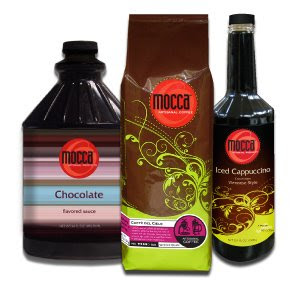TTAB Brew-Ha-Ha: Panel Divides on Grounds for "MOCCA" Refusal
It was a tempest in a coffeepot, as the TTAB panel agreed and disagreed over the registrability of the mark MOCCA for "a coffee product, namely coffee beans, and not including ground-coffee derived coffee." The panel members agreed that the mark is merely descriptive of the goods, but split on the issue of likelihood of confusion with the registered mark MOCA & Design, shown immediately below, for "coffee and coffee derivatives" [MOCA disclaimed]. The majority reversed the Section 2(d) refusal to register, with Judge Rogers dissenting. In re Barrie House Coffee Co., Inc., Serial No. 76678951 (December 18, 2008) [not precedential].

Mere Descriptiveness: Somewhat puzzled by the Applicant's convoluted identification of goods, the Board concluded that its goods, when ground down to their essence, are coffee beans. Examining Attorney Jaclyn N. Kidwell provided dictionary definitions and webpages referring to the term "mocha" as a dark coffee made from Arabian beans. Observing that Applicant's mark MOCCA is "merely a misspelling or the phonetic equivalent of the descriptive or generic term," and noting that a misspelling "is no more registrable than the descriptive or generic word itself" absent some play on words or unique presentation, the Board affirmed the Section 2(e)(1) refusal.

Likelihood of Confusion: The factor in dispute was the similarity of the marks. Because the words MOCCA and MOCA are highly descriptive of the goods, the panel majority ruled that "purchasers will be able to distinguish the marks because the common elements are so highly descriptive that consumers will perceive the terms MOCCA and MOCA as ordinary descriptive speech, not as trademarks."
There is no reason to believe, and there is no evidence on the point, that consumers are likely to perceive the word MOCA in the registered mark as anything other than a type, not a brand, of coffee. To hold otherwise gives registrant the exclusive right to use the word 'Moca' when it is a privilege that it holds in common with all others, including applicant.
The panel majority (Judges Bergsman and Wellington) found the marks "not similar in terms of their appearance, sound, meaning and commercial impression," and it/they therefore reversed the Section 2(d) refusal to register.
Judge Rogers, in dissent, asserted that the word MOCA in the cited mark, even though disclaimed, "is still a significant element of the mark," and he noted that even weak marks are entitled to protection against registration of similar marks for identical goods. Moreover, he pointed out, any doubt on the question of likelihood of confusion should be decided in favor of the registrant.
In sum, Judge Rogers would have affirmed the Section 2(d) refusal.
TTABlog comments: Judge Rogers relies heavily on the recent RSI Systems case (TTABlogged here), where the disclaimer of RSI in the applicant's mark did not prevent a finding of likely confusion. But there it was the applicant who was trying to avoid a Section 2(d) finding by means of a disclaimer; the term RSI was not disclaimed in the cited registrations. Here, significantly, it was the registrant who disclaimed rights in MOCA. Judge Rogers' approach would, it seems, render that disclaimer meaningless.
One might note that Applicant's attorney was the frequent TTAB appellate advocate, Myron Amer. It appears that Mr. Amer appeals every final refusal, no matter how formidable the challenge. His briefs on appeal are usually about three pages long, so presumably his clients feel that it's a shot worth taking. Here are two of his cases for your consideration, one a victory, one a defeat.
Text Copyright John L. Welch 2009.




0 Comments:
Post a Comment
<< Home